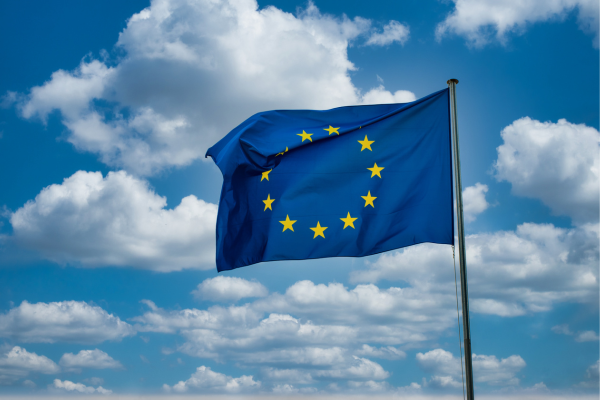BY:
SHARE:

With over a week to go until Halloween, we thought we’d give treat you to a few tales freightful enough to send shivers down even the toughest Logistics Manager or Customs Officer.
The Halloween Letter
The hum of fluorescent lights filled the otherwise empty office, casting a stark white glow over papers strewn across the boardroom table. Brindle and Sons Exports had been in the import-export business for over fifty years, and although the firm’s glory days had faded, it still clung to its existence with stubborn pride. The staff knew little about licensing or export controls; it was a bureaucratic maze they navigated by guessing and skimming through guidelines on the government website, hoping that what they ignored wouldn’t find its way back to haunt them.
On a seemingly ordinary Tuesday morning, the wishful thinking of Brindle and Sons Exports was abruptly shattered.
It all began with a letter - a weighty, urgent missive, stamped with the emblems of the UK Border Force and HM Revenue & Customs. The receptionist, her eyes wide with nerves, placed it on Mr Brindle’s desk before hurrying out. The word 'URGENT' in bold red ink, visible through the envelope's window, was a stark warning. But Brindle, a man more interested in margins than in minor details, dismissed it onto his pile of mail without a second thought.
The first call came later that day. Brindle ignored it, assuming it was another supplier or a Customs broker hounding him for his “urgent attention.” But the calls persisted, each marked by a name his assistant hadn’t heard before. They left cryptic messages mentioning "compliance," "discrepancies," and ominously, “penalties.” Still, Brindle pushed them aside, choosing ignorance over inconvenience.
A week later, the office was fraught with tension. The receptionist’s eyes darted with every ring of the phone, and whispers about visits from uniformed men circulated. It was only then that Brindle retrieved the HMRC letter from his desk, tearing open the envelope with a heavy sigh. His face drained of colour as he skimmed the first few lines.
A cold sweat broke out on Brindle’s brow as he reread the words “unauthorised export,” “compliance breach,” and “substantial fines and potential imprisonment.” The letter warned of controlled items being shipped without proper licensing and listed a series of deadlines to produce documentation, justifications, and explanations—terms he barely understood, let alone knew how to meet.
Brindle scrambled to consult the export manager, but the door to his office was already ajar. Empty. The manager had vanished along with several other employees in roles involving compliance as if they’d sensed the storm before it even arrived. Brindle sank into his chair, realising that his company was adrift in dangerous waters without expertise. His hand hovered over the phone, but who could he even call? Who would know how to untangle the regulations, the licenses, and the endless lists of controlled goods?
Brindle stayed back that night as the building emptied, poring over the spreadsheets, invoices, and export logs, each more inscrutable than the last. The clock struck midnight, but he could still hear faint whispers echoing through the silent office. Every creak and shadow took on a new weight, settling on his shoulders like an invisible, relentless inspector.
Then came the knock.
Brindle’s heart skipped as the door opened, revealing a trio of stern figures clad in dark suits. One held up a badge marked HM Revenue & Customs, the insignia shining in the dim light like a warning. They didn’t wait for an invitation to enter.
“We’re here regarding the unauthorised shipments,” one of them said, their tone as cold as the steel briefcase they carried. Brindle stammered, trying to explain, his hands shaking as he rifled through the unorganised documents. But it was too late; they had already assessed the gravity of his actions.
“You failed to comply with export licensing controls,” another officer intoned. “Some of these items, sir, are on the list of restricted goods. Items like these… aren’t allowed to leave UK borders without government authorisation.”
Brindle stammered something about not knowing, but his excuse sounded flimsy even to his own ears.
As they gathered their evidence, they left him with a final warning. "In cases like this, ignorance is no defence. You’re looking at fines, prosecution, and perhaps even time.”
Brindle slumped into his chair, the weight of his negligence settling around him. The penalties loomed more significant than any invoice he’d ever dealt with, each word of the agents’ warning echoing in his mind. HM Revenue & Customs was not an adversary he could evade or ignore. For Brindle and his crumbling empire, the reckoning had only just begun.
And as he sat alone in that darkened office, the whispers of HMRC echoed, haunting him with every shiver of his unravelling reality.
Intangible horrors await
It was just before midnight on Halloween, and the office was dark as Henderson & Greene Industries, once a shining beacon of success in the defence sector, lay empty, abandoned by employees who didn’t want to be there after hours. Everyone had heard about the “inquiry,” a quiet word whispered in hallways and quickly hushed like an incantation to ward off the inevitable. However, for Evelyn Marsh, compliance officer and veteran employee, the inquiry was more than rumours; it was very real and started with an email from the Export Control Joint Unit (ECJU) pinging into her inbox two months earlier. It should have led to a straightforward audit of their export licensing controls; instead, it was a living nightmare.
The ECJU was now investigating Henderson & Greene’s practices around transferring military technology—intangible technology, a term that Evelyn had glossed over for years without truly understanding. In the back of her mind, she’d always assumed that if something went wrong, it would be someone else’s problem. But that morning’s brief from the ECJU during the audit was clear. Their firm was in deep.
“In light of your lack of documented procedures and evidence of multiple unlicensed transfers of controlled technology, we will need to raise this as a serious breach of the regulation. Prepare to supply all relevant data within the month. And in the meantime, you are ordered to stop exporting.”
Evelyn had forwarded the email warning she received to the CEO, a man who had brushed off her concerns with a half-hearted reassurance that he’d “handle it” and “stop exporting; they don’t live in the real working world these government people”. But his handling amounted to little more than reassurance, and the following weeks were filled with mounting dread, misplaced files, and whispers of employees going “missing”—if only from their desks.
The day of the “visit” came faster than anyone expected. The ECJU inspectors arrived early, dressed in muted grey suits, their eyes like sharp knives ready to slice through any pretence of innocence. Evelyn guided them through the office, her palms clammy as she tried to offer some semblance of warmth. The inspectors offered none in return.
They settled into the boardroom, laying out thick binders and a barrage of technical jargon that made Evelyn’s head spin. They asked for records of licensed exports, procedures for intangible transfers of technology, compliance reports, and assurance that they hadn’t exported anything since the initial audit —all things Evelyn knew she couldn’t give them. There was a constant scratching as they took notes, flipping through files, their expressions hardening with every passing minute.
One inspector, an older man with iron-grey hair and a face as stern as stone, looked up from his notes.
“Do you understand the gravity of these violations, Ms. Marsh?” he asked, his voice low and unwavering.
Evelyn stammered. “I… I didn’t realise we were… I mean, it’s just data, after all, right?”
The inspector’s eyes narrowed. “Controlled military technology, Ms. Marsh. Data that can’t just be sent over email or shared over an unsecured network. Your company has been transferring this information without a licence or document in sight.”
The words hit her like a punch. She looked over at the CEO, but he simply stared back, his face pale and jaw set as though bracing for the impact of something he already knew was coming.
The inspectors moved on, interviewing staff, scouring servers, and noting each unprotected file and unsecured communication channel. With every question, the shadows in the room seemed to grow darker, the silence between them heavy with anticipation. Each member of the ECJU seemed more like an executioner than an auditor.
A cold draft swept through the office when they reached the server room. Evelyn felt the hairs on her neck stand on end as they accessed the files: blueprints, schematics, research notes. It had all been sent abroad to clients they barely knew and countries she could hardly place on a map. The inspector looked back at her; the corner of his mouth turned down. She frantically turned for support to her CEO, but he had vanished as if he’d been intangibly transferred to another location.
“You’ve allowed a free flow of highly restricted data to entities outside the UK. This is not only a violation, Ms. Marsh; this is treasonous.”
That word sent a chill straight to Evelyn’s bones. She wanted to protest, to explain that it was all a misunderstanding, but the inspector’s icy glare silenced her. The ECJU officers gathered their evidence and warned her that Henderson & Greene would face severe consequences: asset freezes, criminal charges, and even imprisonment for executives complicit in the violations.
As the inspectors left, Evelyn remained in the darkened room, feeling a weight pressing down on her chest, a mixture of guilt, dread, and despair. She could almost hear faint whispers echoing through the silent halls, promises of punishment and retribution. Her hand shook as she reached for her phone to call the CEO, but the line was dead, the office shrouded in an eerie, unnatural silence. Somewhere deep in the building, a server light blinked off, one by one, until the office was swallowed in darkness. Evelyn could only sit and wait, the sound of her own breathing the only comfort, as the weight of the law bore down, closing around her like an iron grip that promised no release.
US Trick or Treat season
The rain beat down heavily on the windows of Fairweather Electronics' London office. It was a drab, murky Friday evening, and Sam Kemp, the head of compliance, sat alone in her office, her desk lamp casting long shadows over stacks of files and open web pages. She had been in this line of work long enough to know the difference between a minor compliance issue and a serious one, but tonight, she had discovered something chilling.
The trouble began six months ago when Fairweather’s parent company in the United States had classified several of Fairweather’s products as “EAR99” or “NLR”—items under the U.S. Export Administration Regulations deemed low-risk and generally exportable without special licenses. For the US team, it was a rubber stamp, an assumption that what was compliant in the States would surely be compliant in the UK. Sam had voiced concerns, her instincts warning her of unseen pitfalls, but her concerns were met with polite dismissal. “It’s all under control,” the US compliance officer had told her, his voice calm and indifferent. “Just classify them as ‘NLR’—no license required. Trust me; we do this all the time.”
The UK business had gone along with it, unwilling to dig into the nuances of UK export control laws and go against the US compliance team. They treated dual-use goods like mere office supplies and had been shipping orders all over Europe, Asia, and even parts of the Middle East. What they hadn’t considered—what the US office hadn’t bothered to research—was that the UK regulations differed profoundly in the treatment of dual-use goods. Or maybe they knew, but with offices in many countries worldwide, it seemed too complex and unnecessary to learn the local laws as long as they were compliant with US Regulations.
When the Export Control Joint Unit (ECJU) email arrived that morning, Sam’s hands trembled as she clicked to read. It was a formal audit notice referencing “a review of how they classified dual-use goods.” The language was ominous, mentioning fines, compliance penalties, and potential criminal charges for directors and officers who had failed to comply with the UK’s strict regulations. The words “national security breach” seemed to grow before her glowing eyes.
Her heart raced as she re-checked every shipment classified as EAR99, NLR. Every single one had been sent without a UK export licence. Surely, there wasn’t too much of a difference between US and UK regulations to make this a big issue. But Sam almost cried when she realised that products such as microchips and sensors were all in their system as EAR99, or if coded something like 9A510 flagged with an NLR, indicating no export licence needed. They had customers in the aerospace and oil and gas sectors, plus some military companies who purchased their standard goods. Should any or all of these be coded under the UK Dual-Use List, or should Fairweather Electronics have used a UK Export Licence? Why hadn’t the US team listened to her concerns? It was too late now.
Sam paced the dark office, the silence of the empty building punctuated by the hum of the HVAC system. She could almost feel the weight of the audit pressing down on her, like an invisible noose tightening around her neck. She tried calling the US compliance officer, but the line rang unanswered. It was nearly midnight in London; no one in the States would be awake.
When the two auditors arrived from the ECJU, they were accompanied by an HMRC officer from the non-proliferation team. They were polite but cold, and their silence grew more unsettling with each paper, electronic record, and spreadsheet they inspected. They moved with a precision that felt almost surgical, dissecting the company’s export records, noting each unlicensed shipment with quiet, damning efficiency. Sam could feel her heart pounding harder with every page they turned.
“Ms. Kemp,” one of the auditors finally said, breaking the silence, “are you aware that several of these exports could constitute a serious breach of the UK’s dual-use export regulations?”
She stammered, trying to explain. “Our parent company… the products were classified as EAR99. NLR. It was compliant with U.S. standards....” Her voice trailed off, the words sounding pathetic even to her own ears.
“Ms. Kemp,” the auditor said, his voice colder than the fluorescent-lit office, “the U.S. classification holds no bearing here. These items are controlled under UK law. Exporting without the proper licences is a criminal offence. You understand that, can’t you?”
Sam nodded, feeling a wave of nausea rise within her. The US office’s oversight and their blasé dismissal of her concerns had led them all to this. “We will need to see a complete change in the way you classify your goods, and we want a meeting with your US legal team and serious assurances that the company as a whole will take UK export licensing controls seriously,” the senior auditor said. “And,” added the HMRC office, “if we don’t get it, we do have the power to close down this business and start legal action against …. “ She didn’t need to finish the sentence; Sam heard the word “YOU” loud and clear. When the auditors left, she slumped in her chair, staring blankly at the stacks of files and the myriad of opened documents still showing on the screen, the grey light filtering through the rain-splattered windows. A single thought echoed as she sat alone in the cold, dim room. The US had been careless and reckless. They hadn’t cared about the risks she faced here. But now would she have to pay the price for their indifference and the company she had once trusted.
As she sat in the darkness, Sam felt a creeping sense of dread, a realisation that her career—and perhaps even her freedom—might soon be over. The silence was broken only by the relentless pounding of rain, each drop like the toll of a distant, foreboding bell.
OneCall™ Email assistance as and when required; A one-call solution for all your import, export and customs enquiries. Export help. Import help. Customs help.
Stay informed about customs and international trade matters by subscribing to our OneCall™ service. This comprehensive offering includes a dedicated email helpline for support, timely practical updates direct to your inbox (Did You Know?), monthly UK Customs & Trade Briefings and access to an interactive members' area with an exclusive community for our subscribers.
International Trade Updates & Spotlight Newsletter
Subscribe to our free information emails covering international trade topics...









